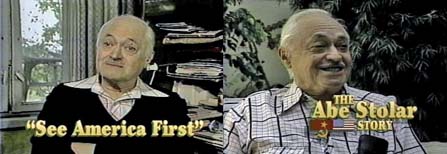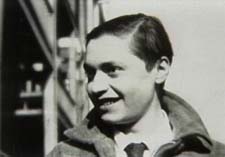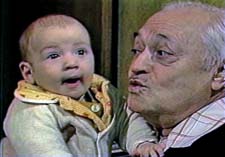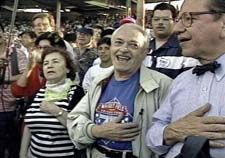See America First: The Abe Stolar Story
Streaming Video
 |
| Above:
On the left, Abe Stolar in his Moscow apartment in September of
1986. On the right, Abe Stolar at a hotel in Los Angeles in the
summer of 1989 at the conclusion of his travels in the United States. |
| A
note from Rich Samuels, the curator of these pages: Abe
Stolar, born in Chicago in 1912, was taken by his Marxist parents
to live in Moscow in 1931. His father disappeared during the Stalinist
purges; his mother spent time in the gulags; Abe served in the Red
Army during World War II and as a translator and announcer for the
English language service of Radio Moscow thereafter. Though Abe
married a Soviet citizen he retained his U.S. passport along with
vivid memories of his home town. Though Abe and his family were
given permission to emigrate in 1975, they were dregged from the
plane at the last moment. Thus began a fifteen-year struggle to
leave the USSR. While a reporter at WMAQ-TV I did countless stories
on Stolar and those truing to secure his emigration. In September,
1986, I went to Moscow to interview Stolar who, prior to that time,
had declined to appear on camera. In March, 1989, the Soviets finally
issued the family exit visas. I went to Vienna to chronicle the
Stolars' arrival in the West. On July 4th of 1989, Abe returned
to Chicago---the city he had not seen in 58 years---the first step
in a cross-country tour that enabled him to "see America last".
The video you can access below tells the Stolar story in very abbreviated
form. It originally appeared on WMAQ-TV in the summer of 1989. [more
background on Abe Stolar to follow] |
|
Part
1: July 4th 1989: U.S. Senator Paul Simon welcomes Abe Stolar
as he arrives in Chicago following an absence of 58 years. Flashback
to September, 1986: Abe, in his dismal apartment on the southwest
side of Moscow, recalls vivid memories of Chicago. It is, of course,
the Chicago of 1931. (And should you perhaps wonder what the residents
of Chicago's Humboldt Park neighborhood sounded like when they
spoke in that remote time, listen to Abe). We meet Abe's wife
Gita, his son Mikhail, his daughter-in-law Julia and Sara, his
granddaughter.
Part 2: March
13th, 1989: Abe and his family arrive in Vienna. The Soviets have
finally granted exit visas to the entire family. The following
day Rich Samuels (the
curator of these pages) accompanies Abe to the Post and Telegraph
building for a live feed to NBC's "Today" show. A brief
history of the efforts that made Abe's return to the West possible.
Part 3: Abe Stolar's
return to Chicago, where he's become an instant celebrity (and
so recognized by Time Magazine, News Magazine and People Magazine).
At a Chicago Cubs game at Wrigley Field he's recognized by WGN-TV's
Harry Caray (though Caray gets the name of Senator Simon wrong).
Part 4: Abe
Stolar tours the U.S. and offers his critique of life in the nation
he hasn't seen in nearly six decades.
|
More
about the Abe Stolar story:
|
| Right:
Abe Stolar in Chicago prior to his departure in 1931 for the USSR. |
 |
 |
Left:
75-year-old Abe Stolar and his granddaughter Sara in the Stolar's
Moscow apartment in September, 1986. Abe at this moment was singing
"If I had a Talking Picture of You" from the 1929 Fox
film "Sunny Side Up". |
| Right:
Abe Stolar singing the National Anthem at Wrigley Field prior to
a Cubs game. Abe is flanked by Gita his wife and Senator Paul Simon.
The late Senator Simon was Abe's principal advocate on Capitol Hill.
But
Chicago Action for Soviet Jewry deserves much credit for keeping
the Stolar family's plight before the public eye. |
 |
|
Credits:
Written by: Rich
Samuels
Directed by: Bob
Webb
Minicam/Chicago: Dave
Adkins, Eddie Banks, Ed Bsrtlett, Hal Bernstein, Larry Collins,
Lauren Caudill, Chuck Haynie, Grant Light, Jim MacDonald, Mabel
Miller, Paul Nagaro, Bill Nuyttens, Roman Polys, Chuck Quinzio,
Pete Ranger, Dwight Samuelson, Gary Sarpy, Dick Smith, Ken Stone,
Jim Stricklin.
Minicam/Moscow: Steve Coppen,
Ken Willinger.
Mincam/Vienna: Christian Kersten,
Joe Oexle, Heinrich Willing, Roman Wiehart.
Minicam/Washington: Estel
Dillon
Minicam/Los Angeles: Sam Cardenas
Stagehand: Miriam Sanchez
Special Thanks: KTUU (Anchorage),
KCNC (Denver), WDIV (Detroit), WSFA (Montgomery).
|
Comments
or suggestions? click
here to send them to Rich Samuels
Created by
Rich Samuels (e-mail to rich@richsamuels.com)
|



